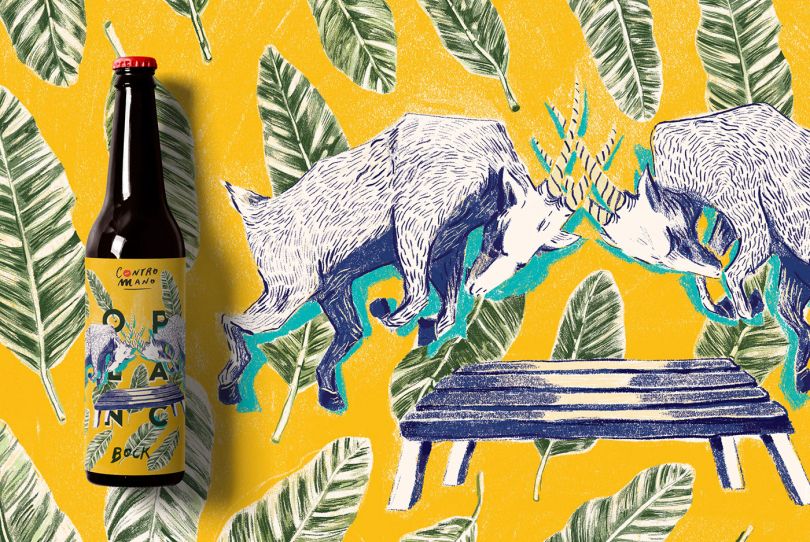A friend recently drew my attention to a new advertising campaign from Quilmes, one of Argentina’s leading beer brands. The beer derives its name from the town where the beer was founded back in the 19th century by a German immigrant named Otto Bemberg. As a result of this fortuitous decision, today the name Quilmes is synonymous throughout Argentina as being one of the nation’s most well-known beers, and not just another nondescript suburb that make up the megalopolis of Gran Buenos Aires.
The new campaign, Lugares (Places, in English), created by Y&R Argentina, asks what would have happened had the town of Quilmes not been so lucky. The campaign, which features, TV, radio, digital, OOH, print, and event/street marketing, launched on 16 November 2009 by asking Argentines what would happen if their beloved beverage had been first brewed in other towns in Argentina.
The work, a few examples of which can be seen below, cleverly demonstrates the comedy of errors that would have ensued had Bemberg decided to set up shop someplace else. Take the following TV spot, which asks what would have happened today if Bemberg had decided to found and name the beer after Juan Jose Paso, a town located in Western Buenos Aires province.
The clip shows a group of guys telling the waitress they’ll each have a “paso”, the presumed shorthand for the beer. The waitress, confused and agitated, misunderstands the young men. This is because in Spanish, “paso” means that you relinquish your turn to someone else, or in the case of ordering at a restaurant, that you don’t want anything. Thus, the waitress thinks that each guy is saying “I’ll have nothing”, and leaves in a huff.
Or what if he had founded the town in San Fernando del Valle de Catamarca, the capital of Catamarca, a province located in Northwestern Argentina?
The label would cover much of the bottle, and store signs would be impossibly long and anger the neighbors, as the store clerk complains about in the above spot.
There are eight different TV spots, referencing eight different Argentine towns, that all follow the theme of the big idea that Quilmes is indistinguishably Quilmes, no matter where it was founded. But the campaign is brilliant for another reason beyond the puns, confusion, and humor of naming a beer after a town with too many syllables: It creatively evokes the tried and true marketing relationship between linking a beer to its country or place of origin.
Tap the Rockies to bring yourself to the cool refreshment of the Rocky Mountains in the Western United States. Step into a Thai restaurant and order yourself a Singha to relive memories of that recent trip to Bangkok. Crack open La Cerveza Mas Fina and you will find yourself on a beach with cold beers and fresh-cut limes (Corona doesn’t explicitly extol its “Mexicaness” as a virtue, but the idea of being the official sponsor of relax wouldn’t work if the beer came from a cold-temperature location). Guinness is “Brilliant” in an Irish accent. The Great American Lager, Budweiser, now part of Brazilian InBev, is so tied to the United States that it will continued to be based in St. Louis, even though it would probably taste the same coming out of a brewery in Campinas. Want to impress your friends? Step into a bar and order a Belgian-Style Farmhouse Ale.
The examples are endless. This is because our enjoyment of beer is sometimes affiliated with where it comes from (granted, there are many other reasons to choose a beer. Busch Light is cheap. Dos Equis is funny. Delirium Tremens has lots of alcohol. Miller Lite “tastes great”). Marketers have long tried to creatively create the link between beer and nationalistic pride. But unlike other campaigns that beat home the nationalism card with melodramatic music, horses, and blatant references to the beer’s origin, the Lugares campaign reminds Argentines of their country – and consequently that Quilmes is Argentine – not by showing light blue and white flags and Maradona, but by poking fun at itself and other random towns throughout all of Argentina.
As many politicians and political strategists can attest, nationalism sells. Lugares cleverly evokes Quilmes’ Argentinidad without going overboard in a way that would potentially alienate consumers. Time will tell how it impacts sales, but the campaign succeeds in engaging consumers by tapping an existing behavior – being Argentine – and making them think about their own country.
Had only Mr. Bemberg’s family settled in Moron, another suburb near Buenos Aires that received millions of immigrants during the 19th and 20th centuries, Quilmes might have a strong case to use this campaign to break into English-speaking markets.

Reply